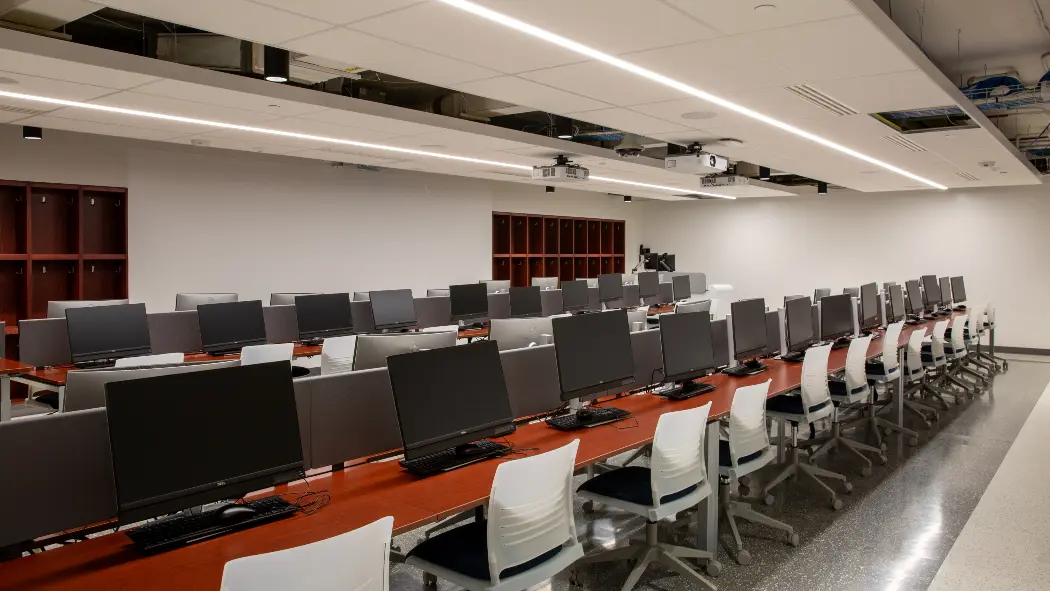

Computer Programmer
Overview
Gain the cutting-edge programming skills and industry insight to design, develop, and deploy software solutions that power tomorrow’s technologies.
The Computer Programmer, two-year diploma program with an optional co-op term, offers students the opportunity to study current trends in software development. This intensive program concludes with a work term for eligible students.
Web technology topics include HTML5, CSS5, JavaScript, jQuery, Bootstrap, React and others to develop user interfaces. Students work with server-side programming languages including Microsoft C#.NET, Python and Java. In the database components, students perform all aspects of database design and work with SQL/NOSQL on several database management systems (DBMS). Students demonstrate their knowledge and skills by developing solutions to real world, three tiered (client, server, database) problems.
Major coursework is assigned as term projects that span entire terms allowing students to actively engage in the evaluation, design and implementation of real world software applications. As a result, student develop deep content knowledge as well as critical thinking, collaboration, creativity and communication skills.
In addition, general education, business, math and communication courses help students expand their organizational, critical thinking and communication skills.
The widespread use of computer technology in all industries, from manufacturing, transportation, construction, education, health and financial institutions means that computer programmers are the key people shaping the solutions of today and tomorrow.
Admission Requirements
O.S.S.D. or equivalent with:
- Grade 12 English C or U
- Grade 11 or 12 Mathematics C or U
Mature Student Assessment for this program is available in the subject of English for the purpose of demonstrating proficiency in this required admission subject. For all other admission requirements, applicants must complete the required course(s) as listed above. For more information, please contact counselling@lambtoncollege.ca. Review the Mature Student Admission process.
Academic admission requirements can be obtained through Academic Upgrading and the Pre-Programs at Lambton College.
Explore First, Specialize Later
Start with a shared first year, so you don’t have to choose your information technology stream right away. Discover your strengths and interests before you decide.
Costs
- Year 1 $4,676.91
- Year 2 $4,586.88
Please Note: These fees apply to the 2025-2026 academic year and are subject to change. Fees do not include books (unless specifically noted), supplies or living costs.
Technology Requirements
In order to keep pace with the requirements of each and every course in your program, Lambton College requires that each student have access to a laptop while studying at our college.
Computer Labs & Software Access
Courses
PC Repair & Troubleshooting
The course provides students with a comprehensive understanding of PC hardware components, their operation, maintenance, and repair. Students will also learn to support and configure various hardware components, and to troubleshoot and resolve problems arising in various environments. Upon successful completion of this course, students will be able to: diagnose and troubleshoot simple technical problems; understand the relationship between the hardware components, the operating system, and applications programs; utilize and implement common support-related methodologies, including maintenance schedules, and virus protection plans; provide proper customer service and support; communicate with clients, technical support, and help desk staff using appropriate PC hardware terminology.
Problem Solving/Program Logic
Programming logic and problem solving - without these foundational skills, software development knowledge may be quickly lost. A language-independent approach introduces students to various components common to all programming languages without assuming any previous programming experience. Students (1) design, test, and debug programs using a top-down modernized approach; (2) control the flow of a program with decision and repetitive structures and functions; (3) implement array processing; and (4) develop programs that process data from files including control break processing. Students develop software solutions using pseudocode and flowchart software tools with an emphasis on problem solving and structured programming techniques.
Networking Basics
This course introduces the architecture, structure, functions, components, and models of the Internet and other computer networks. The principles and structure of IP addressing and the fundamentals of Ethernet concepts, media, and operations are introduced to provide a foundation for the curriculum. By the end of the course, students will be able to build simple LANs, perform basic configurations for routers and switches, and implement IP addressing schemes.
Relational Database Design & SQL
Front End Web Development I
Through a blend of theoretical concepts and practical applications, students master the creation of dynamic and engaging websites. Using a hands-on approach, students integrate modern web technologies to (1) design and implement well-structured and semantically meaningful web pages using HTML; (2) implement Cascading Style Sheets (CSS) to enhance the visual appeal of web pages, including techniques for layout, formatting, and responsive design; (3) incorporate JavaScript that adds interactivity, dynamic content, and functionality to web pages; and (4) design and publish a comprehensive and fully functional website.
Foundational Cloud Administration
This course discusses basic components of Cloud Administration. In this course we will be installing and configuring virtualization on a local host and using only that host's resources. We will be exploring servers and their basic configurations and management functions. Students will be tasked with installing configuring resources, operating systems, and networking using a variety of OS platforms and virtualization components both locally and within a Cloud (SAN). Hands on labs, assignments, and quizzes will be used to evaluate the students on this skill.
General Education Elective (G)
General Mathematics I
This general course in mathematics reviews and enhances topics in arithmetic, algebra, linear graphs, measurement, and statistics. A problem solving approach is used throughout the course, and there are many practical applications.
Python Programming
This course uses the Python programming language to reinforce programming logic and problem solving skills taught in CSD 1133, Problem Solving/Program Logic. Students implement Python programs to (1) design, test, and debug programs using a top-down modernized approach; (2) control the flow of a program with decision and repetitive structures and functions; (3) implement array processing; and (4) develop programs that process data from files including control break processing.
ITIIL Foundations
The Information Technology Infrastructure Library (ITIL®) foundations course provides a practical understanding of Information Technology (IT) service management key concepts, key principles, common language, and practices that enable the ITIL service value system. This course introduces students to the basic principles and structure of ITIL and provides the preparation needed to challenge and successfully pass the ITIL V4.0 Foundation examination.
Project Management
One of the most in-demand IT skills today isn't really an IT skill: it's Project Management. As more and more demands are placed on IT departments, there is more demand for Canadians who understand and can manage in a project-based environment. Using the principles as defined in accepted industry Project Management standards, this course provides a hands-on framework for how to initiate, plan, execute, monitor and control, and close a project. Through lectures, labs and assignments, students look at all stages of project development with an eye to the tips and tricks that do a successful project. In addition, this course prepares students to challenge the CompTIA Project+ or the Certified Associate in Project Management (CAPM)® certification exams. CAPM and PMI are registered marks of the Project Management Institute.
Introduction to Artificial Intelligence
This course introduces the core concepts of Artificial Intelligence, its related fields, and its applications. It covers the principles and fundamentals of AI, including its history and current trends. Students will explore the role of AI in various industries, particularly within Canadian business contexts, to understand how AI-powered solutions are applied to real-world problems. The course examines the relationship between AI and big data, highlighting how large data sets drive AI advancements and insights. Additionally, the course analyzes the role of intelligent agents in AI, explaining their functions and behaviors. A significant component of the course is dedicated to exploring various AI learning methods, including supervised and unsupervised learning, classification, regression, clustering, dimensionality reduction, and deep learning. Students will also examine artificial neural networks, focusing on their components, strengths, limitations, and applications. Lastly, the course delves into the Internet of Things (IoT) and its connection to AI, providing a comprehensive understanding of how these technologies integrate. The laboratory portion offers hands-on practice, allowing students to apply their knowledge to real-life AI challenges.
Workplace Communications
In this course, students write and speak in response to realistic workplace scenarios to build practical communication skills. They produce, revise, and edit written communication geared to the workplace and practice the oral communication and effective listening skills that will help them succeed in professional environments.
Job Search & Success
This course provides student with skills and knowledge to help support their career search and succeed in the workplace. Students align their personal skill set and goals to guide them on their career paths. They will learn how to effectively conduct a job search, build a professional and well-tailored resume and cover letter, and develop and practice interview techniques. Students will also develop their personal brand to help support effective career networking and aid in their job search. Teamwork and collaboration in the workplace are also discussed. Self-reflection is used to inspire insight and support their professional career journey.
Front End Web Development II
As a continuation of CSD 1103, Front-End Web Development I, this course prepares students with the essential knowledge and hands-on skills needed to create dynamic and interactive web applications using JavaScript. Students (1) implement core programming concepts including variables, data types, operators, functions, conditional statements, loops, and arrays to build the logic and structure of JavaScript programs; (2) debug and troubleshoot JavaScript code using browser developer tools and structured error handling methods; (3) manipulate and interact with the Document Object Model (DOM), validate forms, utilize event handling, and apply object-oriented programming principles, including working with objects and classes; and (4) develop event-driven web applications using APIs, AJAX, and jQuery.
Programming C#.NET
The C# programming language is introduced. Students (1) create, test, and debug programs using a top-down modernized approach; (2) implement decision and repetitive structures and functions to control program flow; (3) formulate object-oriented designs using classes, instance variables and methods and constructors; (4) evaluate, create and analyze objects including strings and arrays. Microsoft Visual Studio is used for program development.
Programming Java SE
Various components of the Java object-oriented programming language are introduced. Students (1) develop solutions using data types, I/O, control structures, methods and objects; (2) work with arrays, reference types, inheritance, polymorphism, packages, GUI applications and recursion; and (3) document solutions with javadoc comments.
Database Programming
A comprehensive journey into SQL and PL/SQL database programming within the dynamic Oracle database environment. Using a hands-on approach, students (1) create robust PL/SQL blocks that incorporate program control structures, embedded SQL statements, powerful cursors for data manipulation, and exception handling routines; (2) leverage the power of stored procedures and functions to design efficient, reusable code that scales easily in database development; (3) create packages that encapsulate and organize related PL/SQL objects, fostering modularity, scalability, and maintainability in database projects; (4) create database triggers that automate database actions and enforce data integrity constraints, ensuring database reliability and consistency. This course, combined with added study materials, prepares students for the Oracle PL/SQL certification exam.
Python II
This course is a continuation of Python programming. Students (1) develop applications using Object-Oriented Python; (2) access databases with Python; and (3) use Python libraries and frameworks.
DevOps: Tools and Practices
Modern software development is done with a high degree of velocity, often with software changes being released multiple times daily or weekly. This course introduces students to industry-standard tools and techniques that help manage the development and release of such software using Agile methodologies and DevOps principles. Students (1) evaluate technical and business background details related to DevOps;(2) evaluate Cloud platforms as a deployment option for applications; (3) evaluate responsibilities of operations teams and get familiar with their day-to-day operations;(4) evaluate CI/CD pipelines and their components and discuss micro-service architecture;(5) evaluate containers and containerization as the most up-to-date application delivery method. Throughout the term, students work in teams on a term project, to develop and deploy software with evolving requirements. Students will document these changes based on Software Requirement Specification standards.
General Education Elective
Full Stack JavaScript
As a continuation of Web Technologies II, students design and implement component-based web applications using JavaScript and JavaScript frameworks. This course introduces students to the MERN (MongoDB, Express, React, Node) web stack. Students (1) develop software using modern JavaScript standards (ES6+); (2) develop web applications that maintain a NoSQL database; (3) implement applications adhering to the microservice architectural pattern by developing web API endpoints, and (4) develop applications that run on a variety of computing platforms. Students add to their term project in Web Technologies II by designing and implementing component-based applications that include client-side, server-side, and database processing.
Web Applications Using C#.NET
This course introduces students to modern web application development using the C#.NET Core framework. Students build full-stack applications following the Model-View-Controller (MVC) architecture, integrate SQL and NoSQL databases, and implement RESTful APIs with authentication and authorization. Through practical labs and assignments, students develop secure, testable, and deployable applications using industry tools like Entity Framework Core, MongoDB and Bootstrap. By the end of the course, students can design, build, test and deploy dynamic web solutions that reflect current best practices in .NET development.
Programming Java EE
As a continuation of Programming Java SE, students (1) manage databases using Java; (2) build two- and three-tier client-server applications; and (3) refine industry-standard coding practices. Students build a complete Web-based application that incorporates three-tier development including client-side, server-side, and database processing.
Data Structure & Algorithms
This course is designed to provide a comprehensive introduction to data structure and algorithms, with an emphasis on both theoretical concepts and practical implementations. Students will learn about essential data structures such as linked lists, stacks, queues, and trees, as well as fundamental algorithmic approaches for sorting, searching, and problem-solving. Additionally, the course covers key design patterns within the creational, structural, and behavioural categories, which are critical for effective software design.
Cloud Computing
Traditionally, software applications were deployed on physical servers owned and maintained by the organization developing the software; however, over the past decades, there has been a shift from companies of all sizes towards leveraging cloud computing platforms over in-house servers due to a variety of economic and technical reasons. In this course students will (1) evaluate technical and fundamentals topics of cloud computing, (2) analyze various methods for cloud management, (3) evaluate cloud platform solutions including infrastructure as a service (IaaS) to install and configure virtual resources on the cloud platforms, (4) evaluate storage provisioning, networking, testing and deploying cloud technologies, (5) discuss cloud computing standards, security, the business in cloud computing and methods of planning for cloud integration, and last but not least, (6) discuss cloud deployment options and cloud DevOps.
General Education Elective (G)
Work Term - Full-Time (optional)
Co-operative education provides students with the opportunity to apply classroom learning to the workplace, undertake career sampling and gain valuable work experience that may assist students in leveraging employment after graduation.
Contact
School of Business and Sustainability Leadership
Room B2-106
Program Information
After Graduation
Employment Opportunities

A wide variety of rewarding career opportunities that are dynamic and challenging, offering a competitive rate of compensation are available to graduates. Courses prepare graduates for careers as computer programmers, software developers, web developers, programmer analysts, application developers, systems analyst, information system specialist, client/server applications developers, systems programmers, and application support analysts. Graduates acquire sufficient foundation to allow them to advance in a variety of career paths appropriate to their interests and abilities.
Pathways
Build on your education and complete a college diploma or university degree in Ontario, Canada, or abroad
Want to see more Ontario transfers? Visit ONTransfer.ca.
Co-op
About Co-op
Students in this program have the opportunity to gain valuable work experience by applying classroom learning during co-op experiences.
Learn more about co-op terms and the roles and responsibilities of students and co-op advisors.
More Information
Technology Requirements
It is recommended that you use a Windows laptop for your coursework. While other devices like MacBooks or Chromebooks might work for some tasks, they may not support all the software required for your program. If you're unsure, check with your professors before buying.
Internet Speed Requirements
To get the best experience while learning online, we recommend having an internet connection with at least 40 Mbps download speed and 10 Mbps upload speed. This will help you use video calls, attend online lectures, and access other learning tools smoothly.
Because students live in many different areas, we can't suggest a specific internet provider. You'll need to check with local companies to find one that works best for you.
Laptop Requirements
In order to access the internet and virtually-delivered software and courseware, student laptops should include the following at a minimum. By meeting the following specifications, students will be equipped to access software and courseware on their laptop through the internet:
- Intel i5 8th Gen Processor or equivalent
- 8GB of RAM
- 100 GB HDD or more
- Webcam with a microphone
- Wi-Fi capable (802.11n/ac 5GHz)
- Windows 11 operating system
Mobile Device
Students will require a mobile device (smartphone) for:
- Accessing your digital student ID
- Using campus applications and services
Software
To ensure students are getting the most our of their classroom experience, some software will be required.
Lambton College has made this software easily accessible online. Students can leverage our Microsoft Office 365 software packages and services. In addition, much of the software you require for your courses will be available on demand for use on any device - on or off campus.
